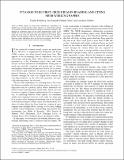It's Good to Be First: Order Bias in Reading and Citing NBER Working Papers
Author(s)
Feenberg, Daniel; Ganguli, Ina; Gruber, Jonathan; Gaule, Patrick
DownloadIt's good to be first.pdf (92.29Kb)
PUBLISHER_POLICY
Publisher Policy
Article is made available in accordance with the publisher's policy and may be subject to US copyright law. Please refer to the publisher's site for terms of use.
Terms of use
Metadata
Show full item recordAbstract
When choices are made from ordered lists, individuals can exhibit biases toward selecting certain options as a result of the ordering. We examine this phenomenon in the context of consumer response to the ordering of economics papers in an e-mail announcement issued by the NBER. We show that despite the effectively random list placement, papers listed first each week are about 30% more likely to be viewed, downloaded, and subsequently cited. We suggest that a model of “skimming” behavior, where individuals focus on the first few papers in the list due to time constraints, would be most consistent with our findings.
Date issued
2017-02Department
Massachusetts Institute of Technology. Department of Economics; Sloan School of ManagementJournal
Review of Economics and Statistics
Publisher
MIT Press
Citation
Feenberg, Daniel; Ganguli, Ina; Gaulé, Patrick and Gruber, Jonathan. “It’s Good to Be First: Order Bias in Reading and Citing NBER Working Papers.” Review of Economics and Statistics 99, no. 1 (March 2017): 32–39 © 2017 The President and Fellows of Harvard College and the Massachusetts Institute of Technology
Version: Final published version
ISSN
0034-6535
1530-9142